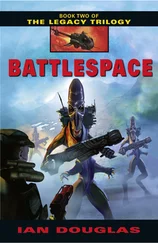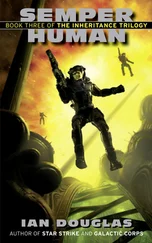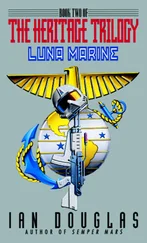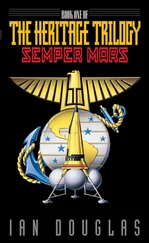“Blue Dragon One, CIC, command channel.”
“CIC, Blue One. Go ahead.”
“This is the CAG. I, ah, heard the chatter just now.”
“Yes, sir.” He wondered if Wizewski was about to chew him a new one for his people’s poor communications security.
“We’re getting the same from every squadron out there. Don’t sweat it. They have a right to know.”
Gray relaxed slightly. “I agree, sir.”
“But not just yet. We’re releasing the tacsit data to squadron leaders, but not to the general fleet. I want you to see this.”
A separate window opened in his mind as new data streamed into his implant. It showed America near the center of a scattering of ships, each tagged with name and hull number.
“It looks like they all did follow us,” Gray said.
“They did. We’re still missing eight ships. They’re probably still outside of our light-speed horizon, and we’ll see them in a few more minutes. Green are ships we know we can trust. Red are probably hostile. Amber are unknowns.”
The twenty-six ships of the original battlegroup were green, Gray noted. So too were twelve more ships— Abraham Lincoln ’s battlegroup—which meant they were North American.
Twelve were red … the Pan-European contingent, minus eight stragglers. The remaining nine—the Chinese—were unknowns.
“Sir,” Gray said, “we’re not going to fight them, are we?”
“I don’t know, son. Possibly they don’t know either. They’re probably going to try to bluff us, and the old man is going to call them on it.”
It seemed like utter lunacy. The North Americans comfortably outnumbered the European warships, but an exchange of fire would cause a lot of damage on both sides, something the human fleet simply couldn’t afford this far from home. Damn it, the Sh’daar and the Turusch and the H’rulka were the enemies … not the damned Europeans!
“We expect the French carrier Jeanne d’Arc to attempt to close alongside of the America ,” Wizewski continued. “The fighters are going to block her, because we can’t afford to let a ship with her firepower get close enough to fire a broadside. One hundred thousand kilometers. That’s the minimum stand-off distance. Understand?”
“I think so, sir. Are … are we authorized to fire?”
“ Only on my command, or on the command of Admiral Koenig himself.”
“Yes, sir.”
“We’re going to try our damnedest to talk our way out of this. If we can’t …”
He left the thought unfinished.
“I understand, sir.”
On the tactical display, the Jeanne d’Arc and her consorts were still almost a full astronomical unit away, but they were on a convergent course, closing with the America . The American ships were positioning themselves in a tight globe around the carrier, with the heavy cruisers Valley Forge and Ma’at Mons , along with a number of frigates and destroyers squarely between the approaching French flotilla and the USNA carriers. The Ma’at Mons , particularly, was a heavy bombardment ship … but she’d expended a lot of her warload against the A1-01 orbital factory. Gray wondered if she had enough munitions on board to keep the Europeans at a healthy distance.
Civil war.
Gray had little use for the Terran Confederation. Hell, as a Prim living out on the USNA Periphery, in the ruins of Old Manhattan, he’d had little use for the United States of North America, either. So far as he could tell, the argument between them involved a difference of strategy. The Confederation wanted to talk with the Sh’daar, and perhaps accept terms, while Koenig wanted to draw the enemy off into deep space, away from Earth and her colonies. Gray didn’t understand how the two could be mutually exclusive, or how Koenig could get away with setting Confederation military policy.
If forced to choose between the two, though, Gray would go with Koenig, if only because he was doing what he thought was right, and to hell with the politicians and rear-echelon second-guessers in Geneva or in Columbus.
Koenig was a fighter, and that was enough for Trevor Gray.
CIC
TC/USNA CVS America
Kuiper Belt, HD 157950
98 light years from Earth
1358 hours, TFT
“Do you think they’ll fight, Admiral?” Captain Buchanan asked.
The voice spoke inside Koenig’s head, since America ’s commanding officer was on the ship’s bridge, forward from the Combat Information Center, which was the central brain for the entire battlegroup. Koenig was looking down into the tactical display tank, where a cloud of green, amber, and red icons drifted toward a seemingly inevitable collision.
“I don’t know, Randy,” Koenig said. “I don’t know Giraurd. Can’t get a handle on him.”
He’d called up every bit of biographical data on Francois Giraurd that he could find in the Fleetnet database, but found little that was useful. Giraurd was only fifty years old, remarkably young for a grand admiral. Born in 2344, he’d been twenty-three, an engineering major at the Sorbonne, when the Sh’daar Ultimatum had come down through their Agletsch proxies. He’d entered the French Acádemie d’Astre as a midshipman cadet in 2368, the year of the disaster at Beta Pictoris, the opening round in the Sh’daar-Confederation War.
His first command had been the gunship Pégase in 2374, and on his promotion to capitaine de frégate five years later he’d been given the command of the De Grasse , serving with the Terran Confederation’s Pan-European contingent.
He’d never commanded a ship in battle, however, for either Pan-Europe or the Confederation. He’d made contre-amiral in 2389, at age 40, then vice-amiral in 2394, and vice-amiral d’escadre in 2397, a spectacularly swift rise up the hierarchy of flag rank. His final promotion to grand-amiral had been conferred in 2403. He’d been in command of a joint Franco-German-Russian fleet in Earth Synchorbit, Koenig noted, during the Defense of Earth, but that fleet had not seen combat.
An uncle of Giraurd’s had been the French prime minister from 2385 through 2397, which just might explain his lightning rise through the ranks. He also had a cousin, General Daubresse, currently on the Confederation Joint Chiefs of Staff, and the Giraurd family was one of the wealthiest in Pan-Europe. Family, political, and financial connections weren’t supposed to have any influence on promotions within the Confederation military, but everyone was all too aware of the reality. Both Pan-Europe and the UNSA had families who’d rotated between politics and the military going back for generations.
“I think he’s more bluff and bluster than anything else,” Buchanan said. “The real problem is going to be DuPont and the politicos back in Geneva. I’d like to know exactly what Giraurd’s orders are right now.”
Koenig had been thinking the same thing. Clearly, the Confederation government had hoped that Girard’s arrival would overawe Koenig enough that he would meekly return to Earth—coupled, carrot and stick, with the promise of being made president of the Confederation Senate.
“Admiral? This is fleet communications,” Lieutenant Julio Ramirez said, interrupting electronically.
“Excuse me, Randy. Go ahead, comm.”
“Incoming transmission from Jeanne d’Arc . Time lag … seven minutes, twenty seconds.”
“Very well.” Koenig opened the channel to include Buchanan. “Captain? You might want to listen in on this.”
“Of course, sir.”
A window opened in Koenig’s mind, static-blasted, then clearing. Giraurd’s face peered out at him. “Admiral Koenig, this is Grand Admiral Giraurd, on board the Confederation star carrier Jeanne d’Arc . I must inform you that I have the authority of the Terran Confederation Senate to place you under arrest if you do not comply with their orders.”
Читать дальше












